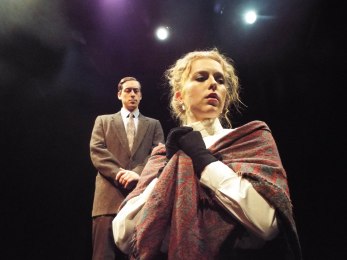Guest post by David Hennessey, CWL Resident Ensemble Member
“You campaign in poetry. You govern in prose.”—former New York Governor Mario Cuomo, The New Republic, April 4, 1985

David Hennessey appears as Anders Lundestad in The League of Youth at the CWL.
Early in Ibsen’s political satire, The League of Youth, Chamberlain Brattsberg, an established and powerful civic leader, is quite taken with the recent charismatic speech of Stensgaard, a young politician. Brattsberg invites Stensgaard to the next room, eager to hear his supposedly innovative views on “by-pass restrictions and conservation variances.” When Mr. Hejre, the town cynic, is also invited to join the discussion, he replies in a near monotone, “I’m all a quiver.” As he knows well, the legal minutia of governing is just not as sexy as the thrill of a fiery speech.
This year’s presidential election is a perfect backdrop to Ibsen’s only comedy, a story about politics. Like actors, politicians also tell stories and we’ve heard many on the campaign trail, with varying degrees of effectiveness. There have been established candidates like Hillary Clinton and Jeb Bush dishing out far more prose than poetry; a visionary like Bernie Sanders tapping into poetic, though surprisingly one-note, inspiration; the youthful son-of-immigrants narrative of Marco Rubio that never quite caught on; the I’m-an-outsider perspective of Ben Carson and Carly Fiorina that failed to cut through the din; the traditional-values stance of Ted Cruz; and, of course, the Joan Rivers-like candidacy of Donald Trump.
“Comedienne Joan Rivers was obscene, vulgar, and cruel. No one escaped her vicious attacks. Not her friend Elizabeth Taylor, her family, or even the Queen of England. For this, we loved her.”—Stacia Friedman, Broad Street Review, September 5, 2014
 I’ve often thought that some things that Trump says at rallies would be considered somewhat typical, though edgy, entertainment if uttered on Saturday Night Live. In that context, many people wouldn’t give them a second thought. But hearing them from someone running for the most powerful position in the world is a new phenomenon in my lifetime. Maybe I’m deluding myself, but I don’t remember hearing such over-the-top insults—usually reserved for stand-up comedy—in a presidential campaign before. That’s probably why he’s generated so much passionate attention from both supporters and opponents alike.
I’ve often thought that some things that Trump says at rallies would be considered somewhat typical, though edgy, entertainment if uttered on Saturday Night Live. In that context, many people wouldn’t give them a second thought. But hearing them from someone running for the most powerful position in the world is a new phenomenon in my lifetime. Maybe I’m deluding myself, but I don’t remember hearing such over-the-top insults—usually reserved for stand-up comedy—in a presidential campaign before. That’s probably why he’s generated so much passionate attention from both supporters and opponents alike.
Passionate attention is very much what actors and performers of any kind strive to create in their audience. But in a theatre, the audience willingly suspends its disbelief to let actors sometimes say and do things we’d never dream of doing in real life. And if we do our job right, audiences will think our characters are believable, but only in the context of that story.
“Back-and-forth banter with fans, as Trump calls them, is a staple of the act. ‘The misconception is that this is just stream of consciousness,’ said Corey Lewandowski, Trump’s campaign manager. ‘It’s not. It is thought out. It’s strategic. It is precise.’”—Michael Finnegan, LA Times, January 29, 2016
 When watching a political campaign, though, I look for the candidate whose words and deeds I can trust the most. It’s a bit different than belief—I might believe a candidate’s promises just because I want to hear them, but can I trust them, too? If elected, his or her actions and words will have consequences in the real world, not just a storytelling world of suspended disbelief.
When watching a political campaign, though, I look for the candidate whose words and deeds I can trust the most. It’s a bit different than belief—I might believe a candidate’s promises just because I want to hear them, but can I trust them, too? If elected, his or her actions and words will have consequences in the real world, not just a storytelling world of suspended disbelief.
Take a break from stories of the election and listen to us tell Ibsen’s story, brilliantly adapted once again by Jeffrey Hatcher. To be sure, it will have echoes in the real world, but none of us is running for office, so the lines between story and reality won’t blur—as they do on much of reality TV and on this year’s campaign trail.
The opinions in this post are personal and do not necessarily reflect those of the Commonweal.
 Most of you know, and perhaps have met, our amazing Ibsen adapter Jeffrey Hatcher. Jeffrey has created the last six editions of our Ibsen productions and will again this year with The League of Youth. What you may not know about Jeffrey is that he is an accomplished author of his own plays and screenplays. Jeffrey’s most notable film work includes Casanova, Stage Beauty and last year’s Mr. Holmes starring Ian McKellen. As a playwright, he has written more than 25 plays including Turn of the Screw which appeared on the Commonweal stage in 2010.
Most of you know, and perhaps have met, our amazing Ibsen adapter Jeffrey Hatcher. Jeffrey has created the last six editions of our Ibsen productions and will again this year with The League of Youth. What you may not know about Jeffrey is that he is an accomplished author of his own plays and screenplays. Jeffrey’s most notable film work includes Casanova, Stage Beauty and last year’s Mr. Holmes starring Ian McKellen. As a playwright, he has written more than 25 plays including Turn of the Screw which appeared on the Commonweal stage in 2010.

